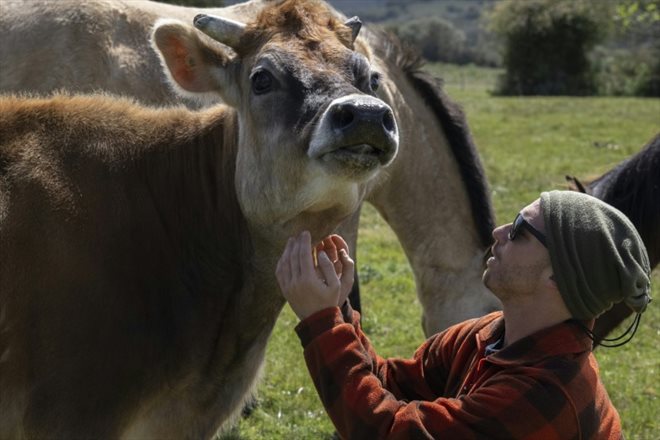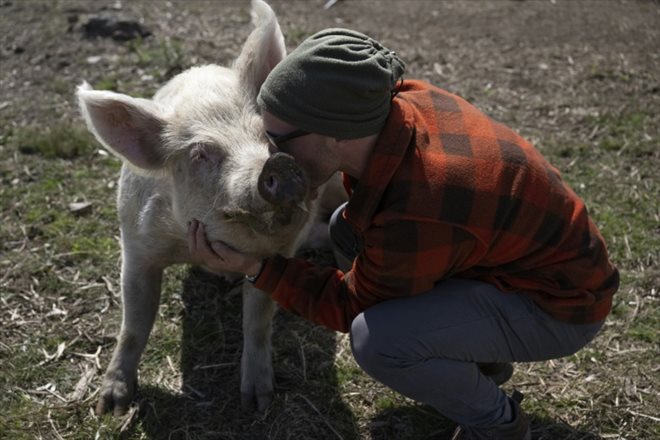A horse saved from the slaughterhouse by the NGO Santuarios Primitivo, in Pan de Azucar (Uruguay) on September 16, 2022 (AFP/Pablo PORCIUNCULA)
“I don’t think we’re going to change the planet with this, but at least we’re doing our part,” says Juan Pablo Pio on his farm in Pan de Azucar, a hundred kilometers east of Montevideo, where four horses graze peacefully ignorant of the sad fate that had originally been reserved for them.
The four horses should have ended their lives in one of the three sites authorized to slaughter horses in Uruguay and whose activity increased by more than 60% in 2021 compared to the previous year. But the NGO Santuarios Primitivo bought them just before they were put to death.
The horsemeat produced in Uruguay is exported in its entirety, particularly to Belgium and France, whereas the Uruguayans – despite being big consumers of meat – do not eat it, considering the horses more as companions than as a possible flat.
“We change the animal’s life, but the animal also changes our life”, assures Juan Pablo Pio, one of the first to have adopted horses through the organization which, since its creation in 2019, has saved 250 horses. welcoming them to some 70 private farms and ranches.
– Save lives –

Juan Pablo Pio strokes his cow Ricotta, in Pan de Azucar (Uruguay) on September 16, 2022 (AFP/Pablo PORCIUNCULA)
Once the horses have been brought to safety, the second stage of the organization consists in finding them “sanctuaries” where they can end their lives peacefully. Once saved from the slaughterhouse, they have an average of fifteen years left to live out of the thirty life expectancy of a horse.
The profile of “adopters” is varied but according to Martin Erro, one of the founders of the NGO, many “city dwellers”, owners of small non-productive farms, are looking for a “connection with nature”.
The adopter is responsible for the upkeep of the equine, which cannot be marketed or exploited, according to the rules of the NGO.
– History and hypocrisy –
Uruguay, a small country wedged between Argentina and Brazil, has some 3.5 million inhabitants and 500,000 equines, or one for every seven inhabitants, which makes it the second country in the world per capita after Mongolia, according to the Uruguayan Association of Equine Veterinarians.
However, there are no horse farms in the country and the production of horse meat is a residual activity of their various uses, such as for work in the fields or sports competitions.
When, for various reasons, the horses are no longer useful for these activities, the owners tend to get rid of them by selling them to slaughterhouses.
But, in a country where eating horse meat can be considered sacrilege, the fact that the ultimate fate of most equines is slaughter may come as a surprise.

Juan Pablo Pio kisses his pig Betty, an adopted animal, in Pan de Azucar (Uruguay) on September 16, 2022 (AFP/Pablo PORCIUNCULA)
“The horse has a specific symbolic weight in our culture, since + the fatherland was made on horseback + until the fact that it is a noble animal which helps the compatriot in his tasks”, explains to AFP the anthropologist Gustavo Laborde”.
There is a “very hypocritical side, because although Uruguayans do not market or consume their meat, the vast majority of horses end up in the slaughterhouse”, he notes.
In 2020, Uruguay was the world’s seventh largest exporter of horsemeat, according to the economic data site of the OEC (Observatory of economic complexity), with Belgium, Russia, France and Japan among the main ones. importers.
The slaughter of equines in the country, which was around 40,000 heads per year between 2012 and 2020, jumped in 2021 to exceed 58,000 animals, an increase of 61%, according to data from the National Meat Institute. (INAC).
© 2022 AFP
Did you like this article ? Share it with your friends with the buttons below.




